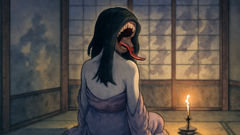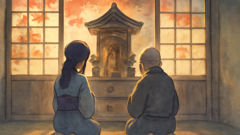Introduction
Mist gathered at the feet of the mountains as dawn tiptoed across the horizon, painting the thatched roofs of a quiet Japanese village with strokes of silvery light. Bamboo groves rustled with the murmur of a world just waking, and in this hush, time seemed to slow, as if holding its breath for the day’s first secret. The people of the village, with faces etched by sun and season, carried a gentle rhythm in their lives: tending rice fields, sharing laughter, and offering silent prayers at the small Shinto shrines nestled among mossy stones. Yet, beneath this surface calm, tales drifted like leaves on water—stories of spirits and yokai, of things seen out of the corner of one’s eye, of inexplicable happenings in the shadowed spaces between light and dark. One such tale, whispered by grandmothers near the irori fire and exchanged by traveling merchants at twilight, is that of the Futakuchi-onna—the Two-Mouthed Woman. Her story is not a simple warning, nor just a lesson wrapped in fear; it is a tapestry woven with longing, greed, regret, and the haunting possibility of redemption. It begins, as many Japanese legends do, in a modest home where rice is precious, silence is heavy, and the most ordinary of lives may hold the seeds of supernatural transformation.
The Rice Merchant and His Quiet Wife
Long ago, in the foothills of Honshu, there lived a rice merchant named Sobei. Sobei’s home stood at the edge of a village where the river’s song threaded through the fields, promising abundance to those who worked with patience and gratitude. But Sobei, though clever with numbers and shrewd in trade, was known for the tightness of his fist. He counted every grain as if it were gold, locking away rice so his own belly ached at night, and fretting over the cost of every mouthful. People in the village called him ‘ketchi’—the miser—and mothers pointed to his shuttered windows as a caution to their children.

Sobei’s wife, Akiko, was as different from him as moonlight from stone. She had come from a nearby village, her family wiped away by illness, and Sobei had taken her in not out of affection but because she asked for so little. Akiko moved through their home like a gentle wind—sweeping floors, tending the vegetable patch, and mending the same kimono year after year. Her voice was soft, her smile fleeting, and she seemed to disappear into corners, as if careful not to take up space. To the villagers, she was a shadow behind Sobei’s gruff presence, but to the village children, she was a secret friend, slipping them sweet rice cakes when Sobei’s back was turned.
Despite her kindness, Akiko grew thinner as the years passed. Sobei, anxious about their stores, tightened his rations even more. At meals, he would serve himself a modest bowl and scrape only the thinnest layer of rice for Akiko. He reasoned she was small and would not need much. Yet each morning, he noticed the rice stores depleting faster than he expected. Suspecting theft, he locked the storehouse and counted the grains obsessively. Still, the rice dwindled, as if stolen by invisible hands. Sobei grew suspicious—he watched his wife closely, convinced she was eating more than her share in secret.
One evening, Sobei confronted Akiko. His words were sharp, accusing her of gluttony and deceit. Akiko bowed her head, protesting quietly, but Sobei would not listen. He stormed from the house, leaving her alone in the gathering dusk. That night, as moonlight crept through the shoji screens, Akiko wept silently into her futon. Her hunger was a dull ache, but her grief was sharper—a wound made by words she did not deserve.
The days blurred together. Akiko’s duties continued, but her spirit faded. Sobei, obsessed with his rice, grew colder, his face lined by suspicion. The villagers whispered that Akiko’s eyes had become hollow, her movements strange. Children who once smiled at her now hurried past her gate. Yet still, the rice vanished. Sobei searched for rats, trapped birds, but found nothing. At night he heard strange sounds—a faint, wet smacking, a muffled voice from somewhere in the house. But when he investigated, there was only silence and the creak of old wood.
One morning, Sobei awoke to a chill in the air and an odd hush in the house. He found Akiko kneeling in front of the altar, her hair unbound and spilling down her back like a river of ink. She did not look up as he entered; her shoulders trembled with an emotion he could not name. Sobei felt something stir in him—a flicker of remorse, quickly smothered by pride. He turned away, but not before noticing a strange scent in the air—a sweetness edged with something wild and unsettling.
The Awakening of the Second Mouth
It was on the night of the new moon that everything changed. Sobei, restless with suspicion and tormented by dreams of rice slipping through his fingers, awoke to an eerie sound—a rhythmic chewing, wet and persistent, echoing through the house. He crept from his futon and padded silently across the creaking floorboards. The kitchen was empty; the door to the storehouse stood firmly locked. The only movement came from the far corner, where Akiko’s futon lay.

As he approached, Sobei froze. Akiko’s back was turned to him, her long hair spread across the tatami like a dark curtain. The strange sound grew louder—the gnashing of teeth, the greedy gulping of rice. Sobei’s breath caught in his throat. He reached out with trembling hands and brushed aside Akiko’s hair. What he saw would haunt him forever: a gaping mouth had formed at the base of her skull, lined with needle-sharp teeth and writhing, pink tongue. The mouth snapped hungrily at the air, its voice a guttural whisper, demanding more food—more rice.
Akiko stirred, a soft moan escaping her lips. The mouth behind her head gnashed and howled, sending shivers down Sobei’s spine. In that moment, Sobei realized the truth—the rice had not been stolen by rats or birds or thieves. His own cruelty, his denial of sustenance to his gentle wife, had summoned this monstrous hunger. Akiko was the victim of a curse—one born of his miserliness and disregard.
Akiko awoke to find her husband staring at her in horror. Tears streaked her face as she tried to explain, but the second mouth roared for food, drowning out her voice. Sobei, paralyzed by guilt and terror, fled into the night. He wandered the village in a daze, haunted by visions of Akiko’s suffering and his own responsibility. The villagers found him at dawn, babbling about mouths and curses, his hair turned white overnight.
Akiko remained in the house, shunned by those who once pitied her. The mouth at the back of her head demanded constant feeding; if it was denied, it screamed in agony and drove her to claw at her own scalp. Unable to bear the pain, Akiko was forced to sneak rice into her hair, stuffing it into the ravenous maw. She grew gaunt, her eyes ringed with exhaustion, her once-kind smile twisted by sorrow. The villagers whispered that she had become a yokai—a creature caught between worlds, cursed by her husband’s sins and her own silent endurance.
But Akiko’s heart had not turned to malice. Though tormented by her affliction, she continued to care for the garden, to sweep the walkways, to leave offerings at the shrine for those even more lost than herself. She wore her hair long to hide the second mouth, moving through the village like a wraith. Only the bravest children dared to approach her, leaving rice cakes on her doorstep in silent sympathy. To them, she would smile—a weary, grateful smile—and offer a prayer for their kindness.
Guilt, Exile, and Redemption
Sobei wandered the outskirts of the village, shunned by neighbors who feared the curse might spread. His mind was a whirlpool of regret; the image of Akiko’s suffering gnawed at him relentlessly. He sought counsel from monks at the mountain temple, hoping for a way to undo what had been wrought. The monks listened patiently, their faces grave, and told Sobei that only true repentance and selfless compassion could break a curse born from cruelty.

Tormented by guilt, Sobei resolved to make amends. He returned to the village, humbling himself before those he had once scorned. He opened his rice stores to the hungry, sharing his wealth freely for the first time. Each day, he left offerings of food at Akiko’s door—freshly steamed rice, sweet red bean buns, persimmons from the orchard. At first, Akiko hesitated, her heart hardened by years of neglect. But as the days passed, she saw Sobei’s sincerity and the way he treated others with newfound generosity.
Sobei begged Akiko for forgiveness. He knelt before her house for hours in the rain, refusing to rise until she acknowledged him. The villagers watched in silence as Akiko stepped outside, her hair veiling the curse she bore. Sobei’s tears mixed with the rain as he confessed his wrongs and pledged to care for her, whatever form she might now take. Akiko saw in him a glimmer of the man he might have been—a man humbled by suffering, desperate for redemption.
They began to rebuild their lives together. Sobei cooked for Akiko each day, preparing enough food for both her mouths. He learned to braid her hair in ways that shielded the second mouth from prying eyes. The villagers, seeing Sobei’s transformation, offered support. Old wounds healed slowly: some days Akiko wept for all she had lost; some days Sobei feared the curse would never lift. Yet there were moments of peace—a shared laugh over spilled rice, the warmth of hands joined in prayer at the altar.
One crisp autumn morning, as red maple leaves drifted past their window, Akiko awoke to a strange stillness. The second mouth was silent. She reached back, heart pounding, and found only smooth skin where the monstrous lips had once gnashed. Tears spilled down her face as she called for Sobei. Together, they knelt at the altar and offered thanks. The curse had lifted—not through magic or exorcism, but through kindness, humility, and the slow, steady work of healing what had been broken.
Conclusion
The legend of the Futakuchi-onna lingers on the lips of villagers to this day—not as a mere tale of horror, but as a mirror reflecting the consequences of neglect and the redemptive power of compassion. In every household where rice is shared and kindness is offered freely, people remember Akiko’s silent endurance and Sobei’s path from greed to humility. The curse of the two-mouthed woman reminds us that the wounds we inflict on others may fester into monstrosities of our own making, yet even the deepest scars can heal when met with understanding and sincere change. In quiet moments beneath the moon or beside the hearth, Japanese families tell this story to remind each other: it is never too late to open one’s heart, to mend what has been broken, and to transform fear into forgiveness.













